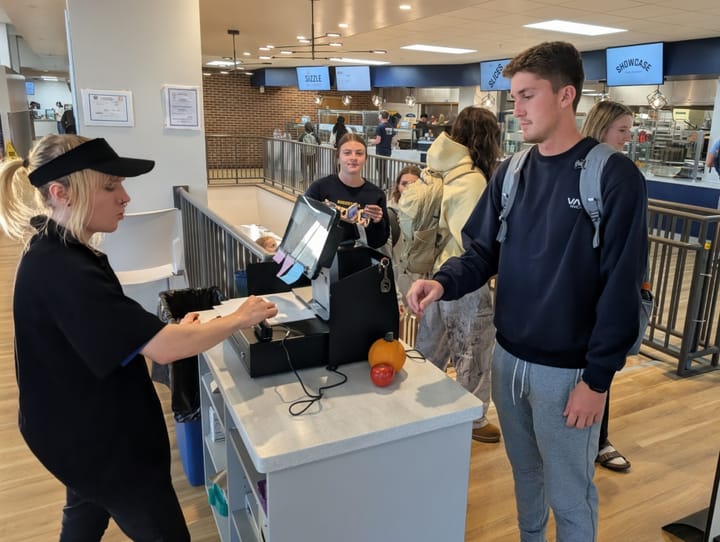Administration approves new brewing minor
A brewing and fermentation minor that involves collaboration with local breweries will be available for students next fall.
Professors Stephanie Bruggeman and Cory Conover have been working to start the minor on campus.
Originally, Bruggeman had planned a farm-to-table class but instead started teaching the class BIOL 216, Beer, Bread and Brie: Preserving the Planet. Bruggeman said food science is a major component of the brewing and fermentation minor.
Conover said his desire to bring brewing to campus began with an apple tree in Norway, where he traveled for a study abroad trip in 2020. He was served homemade apple cider that eventually inspired the planning of the apple orchard on campus, which he says includes a few cider-specific trees.
Through different conversations about brewing on-campus, the two professors met in the middle with help from senior Brayden Harris.
As part of the orchard project, Harris has been working to introduce bees to the area to pollinate the trees and other plants around campus. He said his personal interest in hard cider also helped. Harris knew Conover as “the orchard guy” and brought up the idea of getting equipment to brew cider on campus.
Bruggeman said she got involved as the conversation about cider grew larger and began to include talks of brewing beer. After connecting the two professors, Harris has remained involved in the process of planning the minor from the sidelines. He said he has answered questions, given opinions and rooted for an Augustana-branded beer or hard cider.
Students pursuing the minor will choose from one of two tracks: brewing management or applied brewing. Both tracks will offer classes on the science, history and business of brewing, “just in different ratios,” Bruggeman said. “Everybody starts out the same.”
Beginning with BIOL 216 as the gateway course, both tracks will gain basic scientific knowledge. Students will then take one of three classes: Brewing History and Society; Ecology of Food; or Sustainable Agriculture, Food, and Justice in Italy.
After that, the tracks diverge. Students on the applied brewing track will choose between select chemistry and physics courses. Once they complete one of these hands-on equipment classes, they will move on to brewing with BREW 101 and 102.
Students on the brewing management track will choose between accounting and business administration courses and move on to BSAD 427: Production and Operations Management.
Both tracks will come together for their final class BREW 103, a capstone and internship class, during which students will collaborate on a variety of projects.
“Theoretically, everybody we put out is going to know something about what’s going on in the entire brew process,” Bruggeman said.
She said students minoring in brewing will have the opportunity to collaborate with local businesses and community partners, including Remedy Brewing Co., Fernson Brewing Co., Jessup Cellars, Little Shire Farm and POET.
“Augie is kind of in this little bubble,” Harris said.
He said partnering with businesses in the Sioux Falls community is one of the ways they hope to expand that bubble.
As for students, these partnerships will function as an internship with brewing companies. Conover said the idea is to give students hands-on experience with expert guidance from a brewmaster or someone on the business side.
Bruggeman said that at a brewery, students will be able to work with equipment that they won’t have access to on campus.
“[The community partners are] very gung-ho about this,” Bruggeman said. “They’re very excited.”
The minor was officially approved during a faculty vote on April 25. Bruggeman and Conover said they believe the brewing minor will have positive outcomes for both students and the community.
“I want them to get the confidence to use the tools that we are going to give them,” Bruggeman said. “We’re going to be teaching them troubleshooting on both ends, and to be able to actually troubleshoot and use the knowledge that you’ve gained takes a certain amount of confidence to be able to use that no matter what they go into.”
Conover said the idea of bringing brewing to campus forced faculty and administration to review the dry campus policy. For students like Harris, this change will be a welcome one, but he believes that Augustana will be more of a “damp campus.”
The university already loosened the enforcement in recent years with a beer tent at football games, allowance of alcohol in theme houses and alumni events on campus offering a selection of alcoholic beverages.
“I think it’s high time we have an adult conversation about alcohol on campus,” Conover said.
He also said the university needs to avoid sending a message to students that implies “that this is the repeal of the prohibition and anything goes.”
Bruggeman said she is confident that students will be able to handle the change “respectfully and tastefully.”
On the last day of her Beer, Bread and Brie: Preserving the Planet class, students over the age of 21 were allowed to try some of the alcoholic products they produced. To her surprise, she ended up bringing the bottles, all still nearly full, home with her.
Bruggeman said fermentation is not only about beer. The process can also be applied to medical sciences or heavy production, such as producing ethanol.
Conover believes that students will gain the “core structure to be able to prepare themselves in a more logical way” for a career in brewing.



